Welcome to Trail Guide, your host through the wilds of the 2016 presidential campaign. Itâs Tuesday, Jan. 19, and hereâs what weâre talking about:
- Sarah Palin is backing Donald Trumpâs candidacy for the Republican presidential nomination
- Gov. Terry Branstad says that Iowans voting for Ted Cruz would be making a mistake
- The attacks between Republican front-runners Trump and Cruz are growing nastier
- Ben Carson temporarily suspends campaign after volunteer dies in a car accident
- Cruz accuses Trump of party-hopping, and not the fun kind
- At the Democratic debate in South Carolina, courting the support of black voters was at the forefront for Hillary Clinton, Bernie Sanders and Martin OâMalley
Volunteer to Ben Carsonâs campaign killed in Iowa car accident
A volunteer on Ben Carsonâs Republican presidential campaign died Tuesday from injuries sustained in a car accident while traveling through Iowa.
Braden Joplin, 25, died after a van he was traveling in crashed in icy conditions near Atlantic, about 80 miles west of Des Moines. Three passengers in the van were treated and released from a hospital.
Carson, a retired neurosurgeon, temporarily suspended his campaign and traveled from South Carolina to an Omaha hospital so he could be with staffers and Joplinâs family.
In recent weeks, Carsonâs campaign has struggled internally as his campaign manager and communications director resigned. With less than two weeks until the Iowa caucuses, Carson is polling in fourth place among Republicans at about 9% in the Hawkeye State, based on an average of several state surveys.
UPDATED - 6:22 p.m. This post was updated with a statement from Carsonâs campaign
Sarah Palin talking up Trump
Why John Kasich no longer supports Chris Christie
Hiltzik: Why Bernie Sandersâ health plan is more hope than change
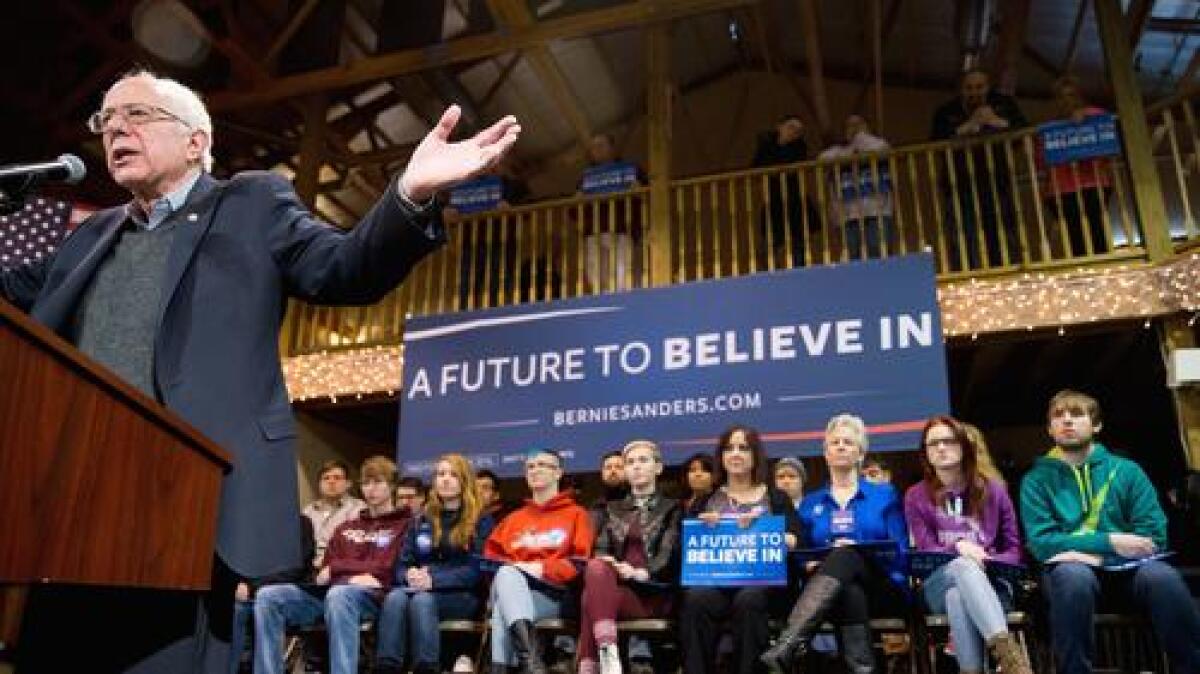
Otto von Bismarckâs famous definition of politics as âthe art of the possibleâ gives us a good assessment of the single-payer health proposal unveiled by Democratic presidential candidate Bernie Sanders on Sunday: impossible.
Thatâs not to say that the âMedicare for Allâ plan offered by Sen. Sanders (I-Vt.) is worthless. Quite the contrary.
Sarah Palin tosses support to Donald Trump
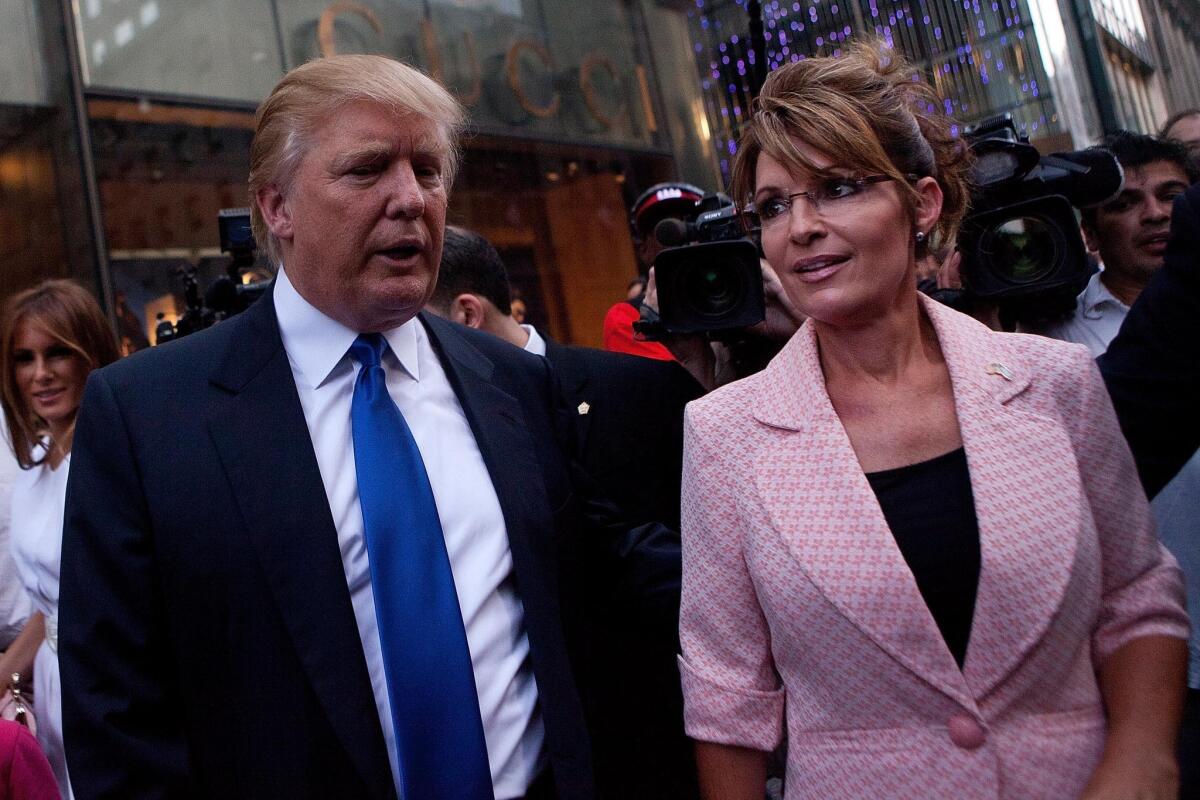
Sarah Palin, a popular figure among evangelicals and tea party followers, endorsed Donald Trump for president Tuesday, giving the New York billionaire a key source of support as chief rival Ted Cruz tries to undercut his standing among conservatives.
Palin joined Trump at a rally in Ames, Iowa, where she hailed his stand against illegal immigration and his vow to take a tough approach to U.S. adversaries on the world stage.
âAre you ready for a commander in chief who will let our warriors do their job and go kick ISISâs ass?â Palin asked Trumpâs supporters at Iowa State University.
The former governor of Alaska can be a polarizing figure. But her strong following among evangelicals and other conservatives makes her a valuable ally at a time when Cruz, a Texas senator, is casting Trump as liberal on abortion, same-sex marriage and other issues.
Like Trump, Palin is a former reality TV star who often attracts the type of free media exposure that Trumpâs opponents can only crave. Trumpâs rally in Ames drew live coverage on national cable news channels for his stump speech; he waited until the end to introduce Palin.
When Trump proposed a temporary ban on Muslims entering the United States last month, Palin came to his defense, saying he was âcommitted to clobbering the bad guys, and putting the good guys first.â
âTrumpâs temporary ban proposal is in the context of doing all we can to force the Feds to acknowledge their lack of strategy to deal with terrorism,â she wrote on Facebook.
Most recently, Palin has been promoting her new book, âSweet Freedom,â a collection of meditations on the Bible.
Powerful Nevada union will not endorse in Democratic primary
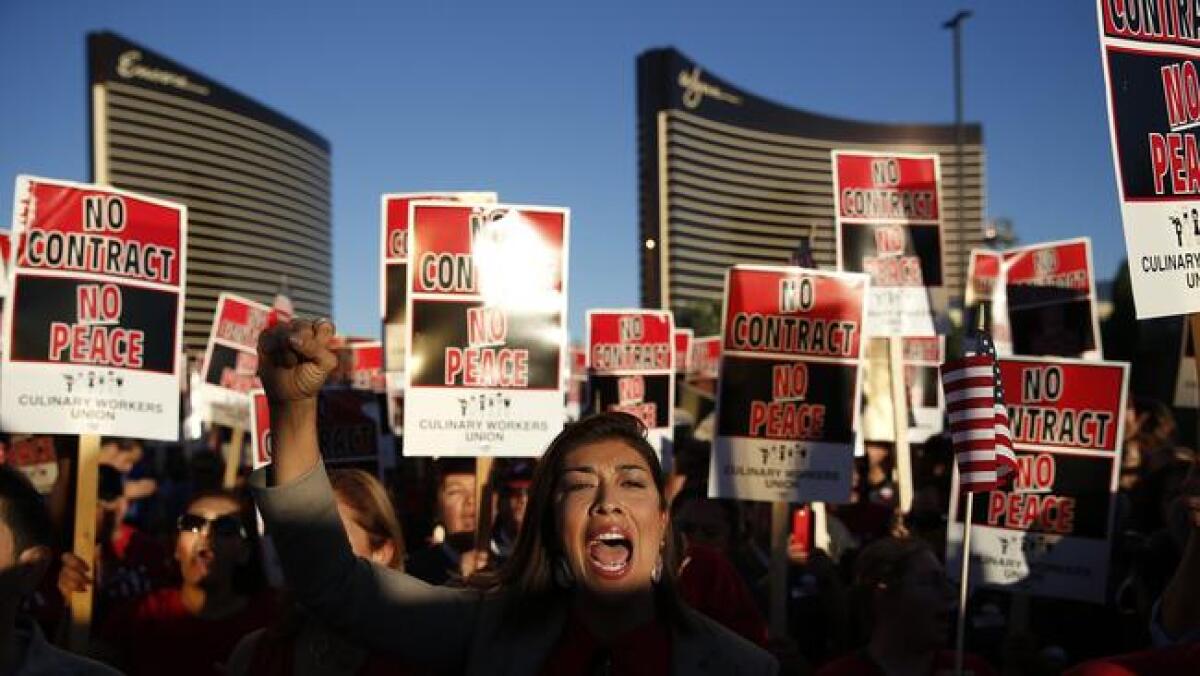
Nevadaâs largest labor organization, the powerful Culinary Union, will not offer an endorsement before the stateâs Democratic caucuses next month, a reversal from 2008, when a bitter fight emerged over its backing.
Local 226, which boasts 55,000 members who serve cocktails in casinos and prepare food for the roughly 50 million tourists who come to the state each year, said in a statement late Monday it will instead focus on helping elect a candidate in the November general election.
Eight years ago, in a closely fought Democratic primary, the union backed then-Sen. Barack Obama over Hillary Clinton. But the endorsement flowered into a hostile dispute, with former President Bill Clinton accusing the union of strong-arming its members â a majority of whom are Latino â into backing Obama.
At the time, the unionâs endorsement proved to have little impact as Clinton went on to win the popular vote in the stateâs caucuses by about 5 percentage points over Obama. However, Obama prevailed with the most nominating delegates from the state.
The Culinary Unionâs influence remains strong because of its ability to organize voters, and Democratic candidates seeking the nomination this year have met with leaders of the union, courting its endorsement.
As the Democratic primary heads west â the Nevada caucuses are third for Democrats, after Iowa and New Hampshire â the support of Latino voters, whose vote is highly influential, will be critical for both Clinton and rival Bernie Sanders.
Polls have shown that the support of minority voters is an uphill climb for Sanders. A recent national survey from NBC News/Wall Street Journal found Clinton leading Sanders 69% to 27% with nonwhite voters.
The Latino vote: Young, growing and better educated than ever
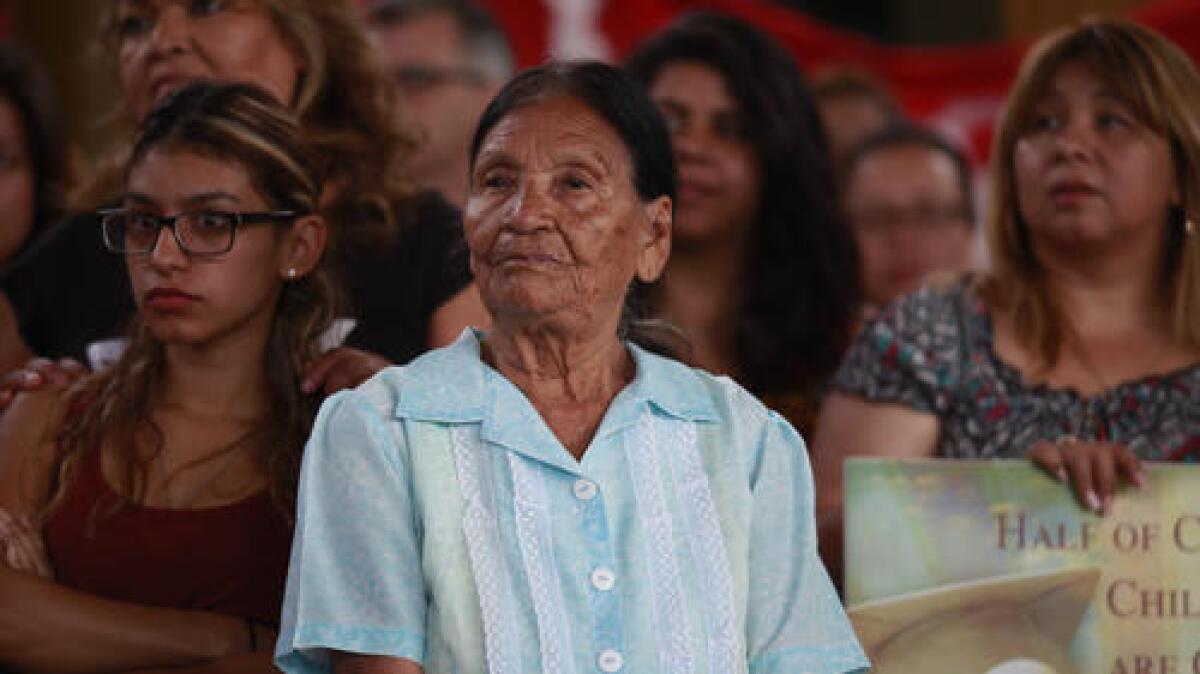
The Latino electorate is bigger and better educated than ever before, according to a new report by Pew Research Center.
Itâs also young. Adults age 18-35 make up nearly half of the record 27.3 million Latinos eligible to vote in this yearâs presidential election, the report found.
But although the number of Latinos eligible to vote is surging -- 40% higher than it was just eight years ago -- and education levels are rising, the percentage likely to actually cast ballots in November continues to lag behind other major racial and ethnic groups, the report found.
Iowaâs governor makes the implicit explicit
Last week, Iowa Gov. Terry Branstad caused a stir by lending credence to the shaky assertion that Ted Cruz was ineligible to serve as president because of his Canadian provenance.
Branstadâs comments were seen as a subtle way of undermining Cruz, who is battling Donald Trump for first place in Iowaâs upcoming caucuses. (Most legal experts say Cruz meets the constitutional eligibility test because his mother was a U.S. citizen, which automatically confers the same status to her son.)
On Tuesday, Branstad made his feelings clear for the world to see:
Branstad has made no public endorsement in the Feb. 1 caucuses, but several of his former aides have signed on with New Jersey Gov. Christie.
Asked about Branstadâs comments, Cruz said it was a sign of panic among establishment Republicans.
âItâs not surprising and weâre going to see even more of that,â he told reporters at a New Hampshire campaign stop, âbecause every day what weâre seeing on the ground is the grassroots are making their decision. Theyâre coming together, conservatives are uniting behind our campaign and we will see, like âThe Empire Strikes Back,â the establishment will strike back.â
1:55 p.m.: Updated to add comment from Cruz
Cruz says Trump is no Ronald Reagan. Rated: True
Apart from his sainted status in the Republican pantheon, Ronald Reagan has become something else: a go-to for candidates accused of switching parties out of political expedience.
Donald Trump, a Democratic-leaning-political-hybrid-turned GOP-presidential-hopeful, is just the latest to invoke the former president when challenged about his relatively recent campaign conversion.
As their rivalry intensifies, Texas Sen. Ted Cruz has begun questioning Trumpâs Republican cred and that comparison to Reagan.
âIâm pretty sure Ronald Reagan didnât write checks and support Democratic politicians like [New York Gov.] Andrew Cuomo and [ex-New York Rep.] Anthony Weiner and Hillary Clinton,â Cruz said Monday at a campaign stop in New Hampshire.
Reagan, a New Deal Democrat in the day, did, indeed, switch political parties. But his changeover was gradual and took place over the course of an extended evolution. Even as he maintained his Democratic registration, he backed Republican Dwight Eisenhower for president in 1952 and 1956, and Richard M. Nixon in the 1960 election.
âUnder the tousled, boyish haircut is still old Karl Marx,â Reagan said in reference to Nixonâs opponent, John F. Kennedy, in a letter offering counsel to the GOP nominee.
Reagan formally changed his party registration in 1962. âI didnât leave the Democratic Party,â he said in a line he often repeated. âThe party left me.â
Unlike Trump, Reagan was an ardent campaigner for conservative candidates and causes before ever running for office. He spent years honing a speechâwhich became The Speech, in political loreâthat enunciated his support for Barry Goldwater and the conservative principles underlying his failed 1964 bid.
The nationally broadcast address helped launch Reaganâs political career, starting with his 1966 election as California governor.
Trump, by contrast, is a comparatively new convert to the Republican Party. As recently as 2011, according to the Washington Post, he contributed more money to Democrats than Republicans. The newspaper and television archives are filled with Trump quotes praising Democrats like Hillary Clinton (and expressing such heretical views as support for legalized abortion, government-run healthcare and higher taxes on the wealthy.)
Ex-Florida Gov. Jeb Bush has also hammered Trump for his past positions. After Trump signed a loyalty oath last fall pledging to support the ultimate GOP nominee, Bush responded on Twitter with his own handwritten note:
Donald Trump returns to Iowa, targets Ted Cruzâs ârough temperamentâ
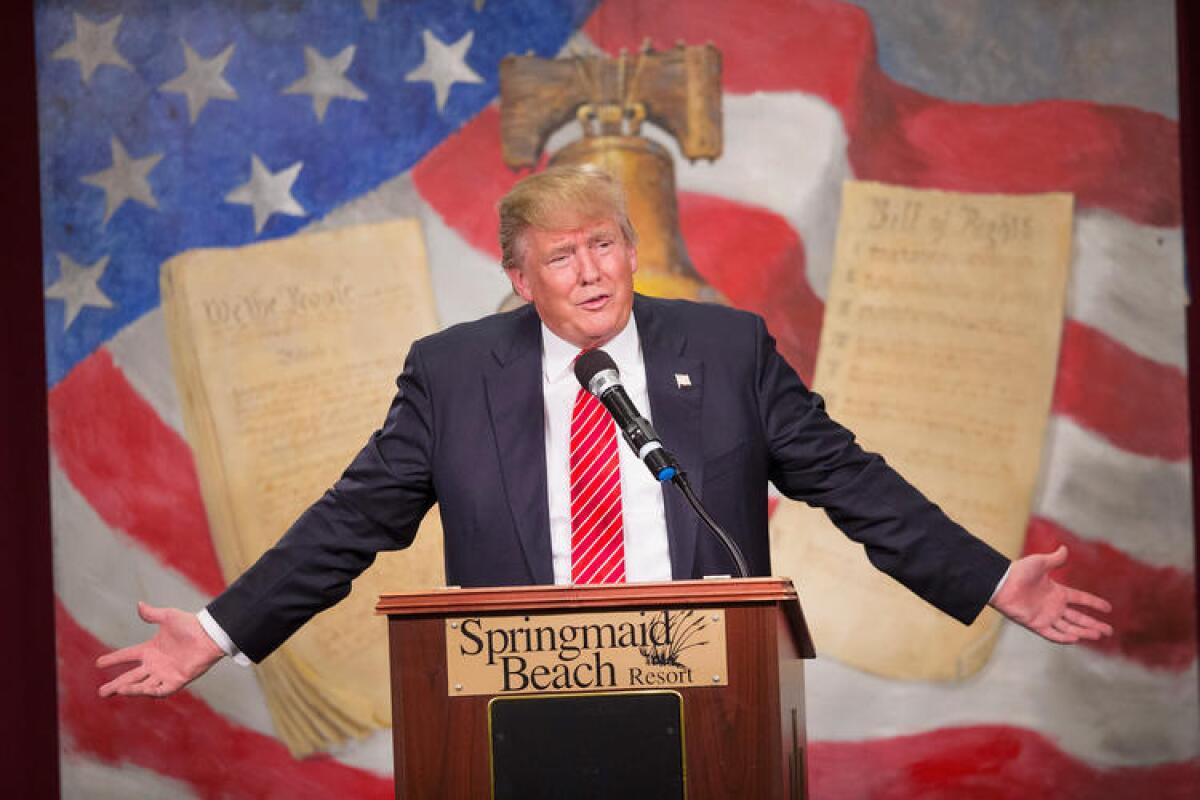
Donald Trump opened an Iowa campaign swing Tuesday with a swipe at archrival Ted Cruz, saying the Texas senator has âa rough temperament.â
âYou canât call people liars on the Senate floor when theyâre your leader,â Trump said, referring to Cruzâs July attack on Senate Majority Leader Mitch McConnell. âItâs not a good thing to do if you want to sort of curry favor and get the positive votes later on down.â
Trumpâs comments at the John Wayne Birthplace Museum outside Des Moines came as the rivalry between Cruz and the New York billionaire is dominating the run-up to the Feb. 1 Iowa caucuses.
Cruz, an unpopular figure among Senate colleagues, has prided himself on challenging Washingtonâs Republican establishment. He also has stepped up efforts in recent days to cast Trump as out of step with conservatives on abortion, same-sex marriage and other social issues. His spokesman had no comment on Trumpâs remarks about Cruzâs temperament.
Trump said Tuesday that his own temperament was âgreat.â He described himself as the âmost militaristicâ of the Republican presidential contenders, but noted his early opposition to the Iraq War, which he saw as a threat to stability in the Middle East.
Speaking to reporters after landing the endorsement of Aissa Wayne, a daughter of the cowboy movie legend, Trump said major unnamed Republican leaders had quietly begun to rally behind his campaign, which many of them had failed to take seriously for months.
âThey are contacting us left and right about joining the campaign, and these are serious establishment types,â Trump said.
Trump plans to announce what his campaign has billed as a major endorsement later Tuesday, but he declined to comment on new reports that it would be Sarah Palin, the former Alaska governor.
âIâm a big fan of Sarah Palin,â he said. âBut Iâm not saying who it is.â
Cruz accuses Trump of arriving late to the immigration conversation
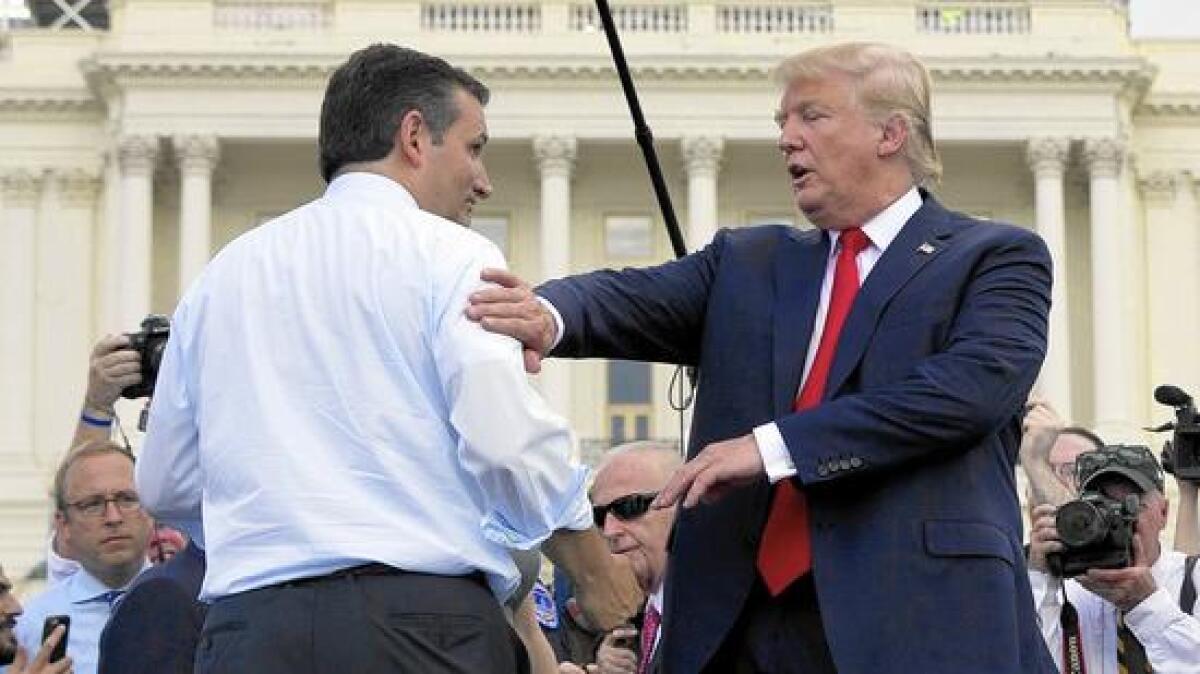
Ted Cruz is warning voters that if theyâre considering Donald Trump, they should ask where he was during the immigration fight over the last few years.
âYou have reason to doubt the credibility of the promises of a political candidate who discovered the issue after he announces for president,â Cruz said of Trump during a campaign event Monday in New Hampshire.
Cruz, the Texas senator, said voters should be concerned because Trump remaining quiet during a crucial debate over immigration policy in 2013. The debate culminated in immigration reform legislation that year that Cruz opposed. It ultimately failed in the House.
During last weekâs debate in South Carolina, Trump and Cruz attacked each other openly â Trump on Cruzâs eligibility for the presidency because of his Canadian birth and Cruz on Trumpâs âNew York values.â
On Sunday, Trump called his rival âa nasty guy.â
âNobody likes him, nobody in Congress likes him, nobody likes him anywhere once they get to know him,â Trump said in an interview with ABC.
In New Hampshire a day later, Cruz attacked Trumpâs tweeting habits and reliance on polls to prove his worth. He questioned the businessmanâs loyalty to Republican values, too. Trump supported President Obamaâs stimulus package in 2009, calling him a âstrong guy who knows what he wants,â Cruz noted.
Rand Paul: I want to âaudit the Tedâ
How do you ease a sharp-edged, direct attack accusing an opponent of cozying up to Wall Street? Rand Paul went with two noseless cartoon characters with robotic voices.
The charactersâ digitally automated voices go after rival Ted Cruz, saying itâs time to âaudit the Tedâ -- a play on Paulâs repeated calls to audit the Fed(eral Reserve) -- and attack Cruz for accepting too much campaign money from financial giants such as Goldman Sachs.
âI hear Wall Street money â millions â even $1 million from the Goldman Sachs,â the female cartoon says. (The video is worth it for the slightly off syntax alone.)
âDoes the Goldman Sachs want to audit the Fed?â the male cartoon asks.
âI donât think so; they are the Fed,â she responds, claiming, robot-voiced, that the big banks and the government are too close.
Cruz reportedly failed to disclose about $1 million in assets from Goldman Sachs that supported his run for his Senate seat. His wife works at Goldman Sachs and is on leave during the campaign.
Democratic debate wouldâve been second-most-watched -- in 2008
The fourth Democratic primary debate broadcast Sunday on NBC was watched by 10.2 million viewers, according to Nielsen data.
The figure ranks second among the four Democratic debates held so far and is up substantially from the 8.03 million who watched ABCâs telecast of the Dec. 19 meeting of the three contenders for the 2016 Democratic nomination, former Secretary of State Hillary Clinton, Sen. Bernie Sanders and former Maryland Gov. Martin OâMalley.
The debate, moderated by âNBC Nightly Newsâ anchor Lester Holt and NBC News chief foreign affairs correspondent Andrea Mitchell, was also seen by an additional 1.2 million viewers across Internet streaming platforms including NBCNews.com and the news divisionâs YouTube channel.
The ratings likely got a boost from the Sunday night time slot.
Republicans yank debate from NBC
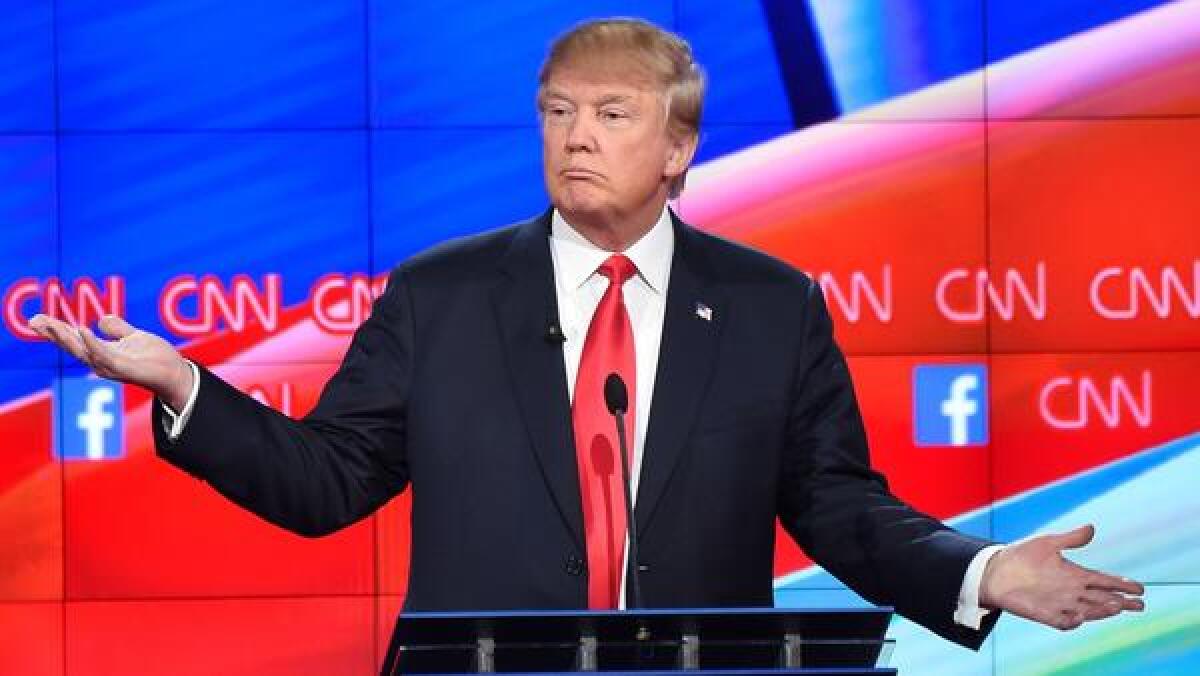
The Republican National Committee has made good on its promise to cut NBC out of its presidential primary debate schedule.
RNC Chairman Reince Priebus issued a statement late Monday announcing the cancellation of a partnership with NBC, which was set to carry a primary debate from Houston on Feb. 26. The event will now be staged one night earlier by CNN.
The committee was intent on punishing NBC over what it perceived as harsh treatment from the panel of CNBC moderators at the Oct. 28 Republican presidential debate shown on the cable network.
Decker: The Clinton-Sanders divide spills into California
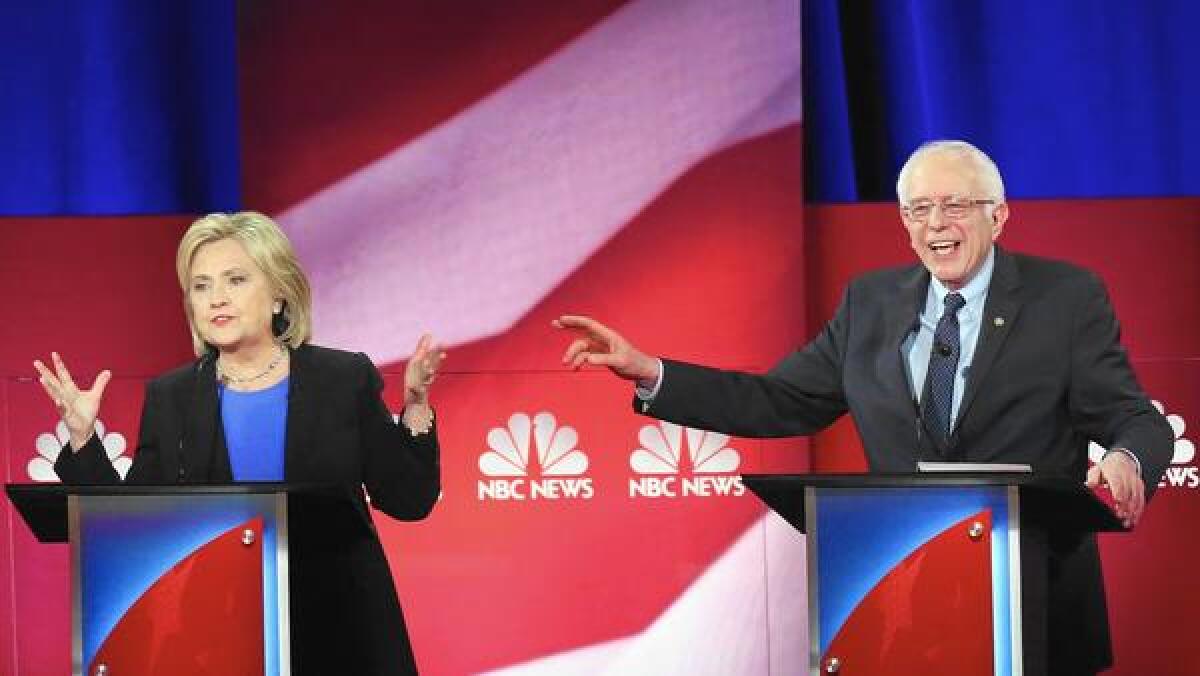
En route to Hillary Clintonâs expected coronation as the Democratic presidential nominee, her party has been caught in an ideological clash pitting the former secretary of Stateâs loyalists against the factions backing Vermont Sen. Bernie Sanders.
The feud is blazing not only nationally but in blue California, where it is one of several schisms among Democrats.
British lawmakers call Donald Trump a racist and a buffoon
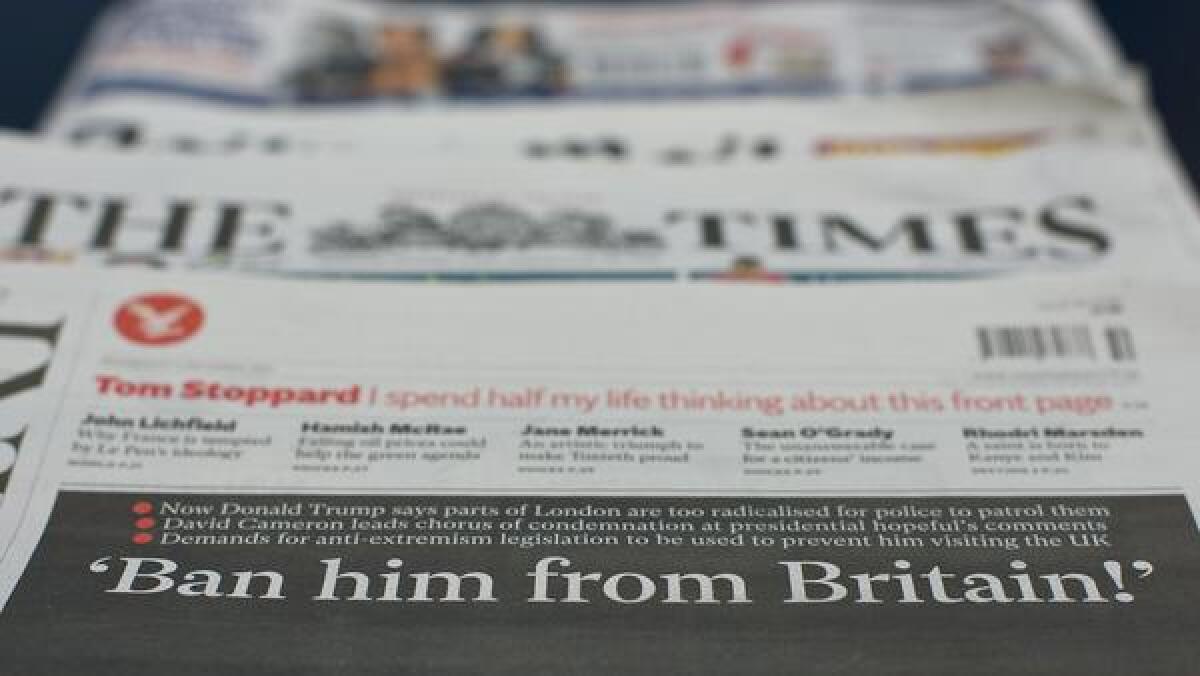
British lawmakers on Monday debated whether Donald Trump should be banned from Britain, after an online petition calling for him to be denied entry for making controversial anti-Muslim comments amassed more than 570,000 votes.
âHis words are not comical. His words are not funny. His words are poisonous,â said the Labor Partyâs Tulip Siddiq. âThey risk inflaming tension between vulnerable communities.â
The unusual and, at times, passionate debate was held in response to the Republican presidential candidateâs statement that all Muslims should be temporarily barred from entering the U.S. in the wake of the shooting in San Bernardino last month that left 14 dead.
In a state still stinging from racial attack, Democrats reach out to black voters
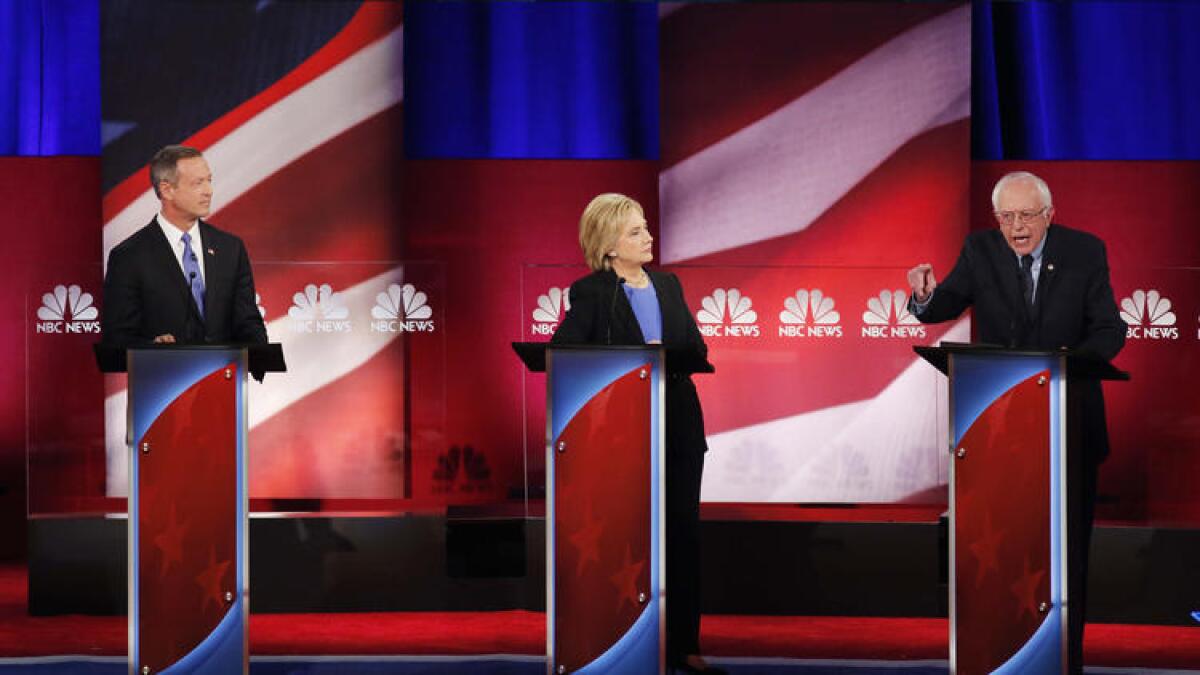
Debating less than a block from where nine black parishioners were gunned down in a savage, racially motivated attack, Democratic presidential hopefuls on Sunday zeroed in like never before on a critical pool of support: black voters.
Race and the social ills faced by blacks â in particular black men â was more central to the debate than at any previous gathering among front-runner Hillary Clinton and her rivals for the partyâs nomination, Sen. Bernie Sanders of Vermont and former Maryland Gov. Martin OâMalley.
The three Democrats proposed ways to limit gun violence, laid out their views on how to repair relationships between police and the communities they serve, and spoke passionately of trying to create economic opportunities for disenfranchised young black men.
âThere needs to be a concerted effort to address the systemic racism in our criminal justice system,â Clinton declared in the debate hosted by the Congressional Black Caucus Institute.